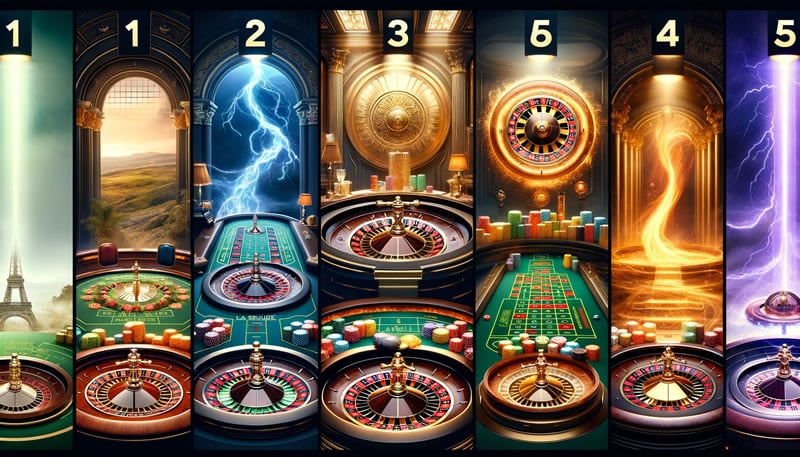The allure of the jackpot is so strong that people from all walks of life find themselves captivated by it. A strong allure that is hard to resist comes from the chance of winning a sizable quantity of money through gaming at casinos, playing lotteries, or other games of chance. For millions of people around the world, the idea of achieving sudden wealth and financially independent in an instant holds great appeal. Several psychological factors contribute to the jackpot's allure.
Key Takeaways
- The allure of the jackpot: The thrill of winning big draws people in due to the potential for life-changing rewards.The dopamine-driven jackpot effect: Our brain's reaction to potential rewards, such as winning a jackpot, is driven by the release of dopamine, creating a feeling of pleasure and motivation.Risk and reward dynamics: Our draw to jackpots stems from the combination of risk with the possibility of reward, engaging the brain’s reward circuits.The psychology of hope and optimism: The possibility of winning big influences our outlook, fostering feelings of hope and optimism for the future.Social and cultural influences: Our attraction to jackpots is shaped by social norms, cultural norms, and peer pressure.
The ability to enjoy luxury without worrying about money and the possibility of financial liberation is highly appealing to many. The attraction of potentially being able to afford anything, such as designer clothes or far-flung travel, pushes individuals to strive for big successes. Also, a major part of the jackpot's appeal stems from its unexpected nature & uncertainty. One cannot easily duplicate the excitement that is produced by the prospect of striking it lucky with a single ticket purchase or by spinning the wheel for a large payout. The allure of the jackpot also appeals to our innate desire for adventure and excitement.
The chance of getting rich offers the promise of a thrilling new life free from the routine of day-to-day living. Many people are motivated to chase after huge jackpots because they feel a deep connection in the idea of taking a chance & possibly emerging victorious. The thrill of placing a huge bet or the suspense of waiting for the lottery results are just two examples of how people are drawn to jackpots because they represent human nature's need for excitement and risk. The Function of Dopamine in Expecting Rewards. Dopamine is critical in attracting us to potential rewards, which is why jackpots are irresistible.

A neurotransmitter called dopamine is released in response to pleasurable experiences like eating delicious food, taking part in enjoyable activities, and yes, hitting a huge win. Dopamine plays a crucial role in the brain's reward system. Dopamine is triggered in our brain in anticipation of a possible reward, such as a lottery win, which makes us feel good and makes us want to go after the reward even more. The Dopamine-Propelled Chase of Massive Victories. There’s a powerful drive to look live casinos games for chances for large wins by the strong psychological pull that is fueled by dopamine production in response to possible rewards.
The possibility of winning the lottery floods the brain with dopamine, which produces an irresistible rush and joy. This dopamine surge that drives our desire to take risks in the hopes of striking it rich & draws us to jackpots. Addiction and compulsive behavior: dopamine’s downside. The brain floods dopamine when one is expecting great success, which can create an extremely addictive feeling of excitement and anticipation. Some people develop an addiction to gambling, which can be explained by the role dopamine plays in our draw to jackpots. A strong psychological pull that can result in addiction & a loss of self-control is driven by the dopamine released for potential rewards.
Humans' innate drive for risk is closely tied to the the lottery's attraction. The chance of a huge win is a high-stakes game that draws in our deep need for risk and excitement. Our interest in jackpots is driven by the risk and excitement that comes with chasing large wins. Lots of people are motivated by the concept of risk-taking and possibly hitting it big, which pushes them to gamble in the hopes of winning the ultimate lottery prize. Our evolutionary past as hunter-gatherers may also be used to explain the connection between risk-taking and reward-seeking in our fascination with jackpots.
Taking chances has been crucial to human survival throughout our evolutionary past because it often determined gathering food and going without. Because our ancestors found this behavior beneficial in obtaining food, shelter, and other necessities, it became hardwired in us to seek out high-reward risks. This natural inclination for risk still shapes our actions today, leading us to chase jackpots and encourage us to take chances in the hopes of hitting big.
Risk and reward drive our pull to jackpots, which relates to our need for independence and control over our own lives. The chance to become wealthy offers the chance to live life without limits and on one's own terms. The opportunity to take a risk and perhaps landing huge rewards taps into our innate need for independence and personal agency, which drives us to chase big rewards in the quest for financial independence. Our attraction to jackpots is largely driven by the optimism and hope that big wins inspire. The possibility of striking it rich sparks hope for a better future, which bolsters our confidence and inspires us to aim for large wins.
It is difficult to resist the optimism that arises from the idea that one lucky moment has the potential to improve our lives. The possibility of vast wealth draws on our desire for optimism and hope, pushing us to take risks in the quest for future prosperity and financial stability. The optimism and hope psychology also has a significant impact on how we think in the pursuit of big wins.
We are energized by hope and we are inspired to keep chasing after large wins despite the odds when we have the possibility of winning the jackpot. This sense of hope and excitement can create addiction-like behaviors. We gamble for financial freedom because we have an unyielding optimism that one fortunate break could change our future. The role optimism plays in our mindset when it comes to going for big wins also relates to our deep desire for control of our own lives. Our optimism is fueled by the possibility of winning big, which inspires us to take risks in the pursuit of financial independence and freedom from financial constraints. We can't ignore the influence of social & cultural factors on our jackpot fascination.
We are bombarded with messages that reaffirm the appeal of getting rich, from the popular media's portrayals of sudden wealth to social pressures to attain financial success. Our attitudes toward chasing large wins are shaped by cultural and social messages, which fuel our jackpot addiction and spur us to take chances in the pursuit of money. Social pressure and social norms are just two more examples of how social and cultural factors affect our attraction to jackpots. Chasing big wins is seen as an admirable, glitzy, and thrilling endeavor in various social groups.
People may chase large wins in an effort to gain validation or validation from others by feeling pressured to match the success of peers or coworkers who have made money through gambling. Our innate need for status is further evidenced by the societal influences on our attraction to jackpots. The reason we crave jackpots and pushes us to gamble in the hopes of winning big is the chance for wealth and fame, which can further improve one's social status. The Addictive Nature of Jackpot Pursuits. Dopamine's influence on big wins can set off an addictive cycle that causes individuals to keep gambling in the hopes of hitting it big, often at a huge cost.
The act of chasing losses can create a detrimental cycle that could seriously impact an individual's financial stability and general well-being. The Dark Side of the Jackpot: Mental Health and Relationships. Pursuing big wins can take a toll on relationships and mental health in addition to financial ruin. Gambling addicts frequently struggle with mounting debt & money problems, which can leave them feeling anxious, depression, and feelings of despair.
In addition, gambling for jackpots can damage personal relationships, leaving one feeling alone & isolated. The necessity of Support & Awareness. The dangers of chasing jackpots highlight that individuals struggling with addiction need compassion and assistance.
It is imperative that society recognize the risks of gambling and offers assistance to individuals who may be at risk of developing addictive behaviors. By doing this, we can work towards a setting that is safer and more encouraging for people who might be having trouble the temptation of jackpots. Develop strategies for responsible gambling behavior to help people manage the psychological effects of jackpot pursuits.
Limiting the amount of time and amount of money invested on gambling activities can help people stay away from compulsive behavior patterns and reduce the risks in chasing large wins. For those who may be battling addictive behaviors linked to chasing jackpots, seeking support from friends, family, or professional counselors can be a great resource. Individuals can protect themselves from developing compulsive gambling behavior patterns by learning effective coping mechanisms for handling stress and anxiety.
People can discover healthy ways to manage their stress without turning to high-risk gambling activities by exercising regularly, practicing mindfulness, or pursuing relaxing hobbies. In conclusion, individuals of all backgrounds are fascinated by the jackpot because of its strong allure. Our attraction to big wins is driven by numerous mental triggers, ranging from the release of dopamine in reaction to possible rewards to our natural craving for risk. However, to avoid falling into gambling addiction, individuals need to recognize the dangers involved in jackpot pursuits and adopt healthy habits for managing the emotional effects.
Individuals can still enjoy the thrill of jackpots without giving in to the negative effects of compulsive gambling behavior by comprehending the psychology underlying our attraction to jackpots & adopting positive, healthy gambling habits.

FAQs
What is the psychology behind the attraction to winning big jackpots?
Our interest in large jackpots is rooted in the human brain's reward system. When we anticipate the possibility of winning a large sum of money, our brains produce dopamine, a neurotransmitter linked to joy and reward. This dopamine release makes us feel good and anticipation, making it addictive.
What keeps people playing after they lose?
People continue to play for jackpots even after experiencing losses due to the phenomenon known as "near-miss" experiences. When players almost win, it triggers a surge of dopamine similar to that of a real win. This near-miss experience can create a sense of hope and drives them to keep playing, despite previous losses.
What role does social influence play in the attraction to winning big jackpots?
Social factors are key in the attraction to winning big jackpots. The prominence of jackpot winners in the public eye and within social circles can create a sense of social proof, leading individuals to believe that winning is achievable and desirable. On top of that, the joy and celebration around big wins can motivate others to start gambling.
What are the downsides of craving jackpots?
Craving big wins can have negative consequences, particularly when it becomes compulsive or addictive. Constant gambling in pursuit of jackpots can result in financial strain, damage personal relationships, and mental health issues. Additionally, the craving for jackpots can create false hope and skew one's view of odds.

What are healthy ways to handle jackpot attraction?
You can keep jackpot cravings under control in a healthy way by limiting time and money spent on gambling, practicing responsible gaming, and asking for help if they suspect their interest is turning into an issue. It's important to keep gambling in perspective and enjoy it for fun over obsessing about winning big.